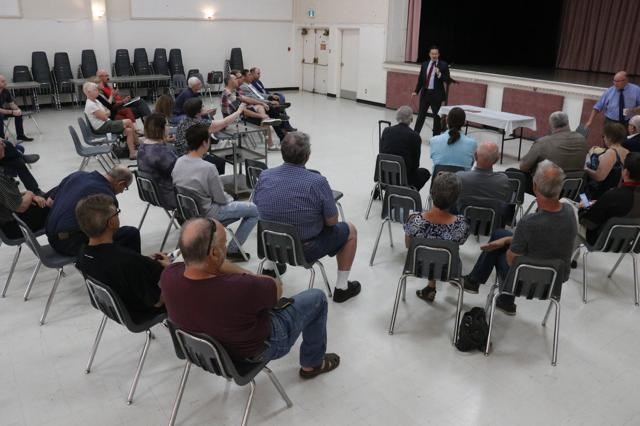The federal Conservatives promise to repeal the carbon tax as one of their first priorities if they are elected in the next federal election, an audience was told at a town hall meeting on Friday morning at McKenna Hall.
The meeting was hosted by Souris-Moose Mountain MP Dr. Robert Kitchen, who had the Conservative Finance critic, MP Pierre Poilievre, as a guest speaker, and they fielded questions on a range of federal issues, including trade, equalization payments and the debt in addition to the federal carbon tax.
The Conservatives have been stonewalled by the Liberals as they have made information requests about what the costs of the carbon tax will be to Canadians, Poilievre explained.
He filed an access to information request to the government, and eventually received a 200-page report on the tax with all of the numbers blacked out, “so we’re not allowed to know what the tax will cost us.”
As he has found out through other sources, “the carbon tax is insidious. They are embedded in the price of goods made with fossil fuels,” said Poilievre, noting this means quite a large range of manufactured goods in addition to items like gasoline and natural gas. “All of these goods are more expensive.”
He suggested that if Canadians were aware of the true “sticker shock” of the cost of the carbon tax, “they would be in revolt”, and this is why they are hiding the facts about the impact of the tax.
When asked what the Conservatives will do with the carbon tax if they are elected to government, he earned some applause when he said that they would repeal the carbon tax as one of their first acts.
The Conservatives have filed a complaint with the information commissioner about the redacted report, with information requests made to both Finance Canada and Environment Canada, “and I’m hoping it will lead to an order to release all the numbers. I want to tell you we’re not just going to complain about what is wrong.”
The party, under the direction of leader Andrew Scheer, is putting together a platform that address this and many other concerns relating to a free market system, said Poilievre, one that reflects the concerns of common people.
As a historic sidenote, he pointed out that this is the reason the floor of the House of Commons is green, to reflect that farmers and regular people are the ones that the Members of Parliament are in Ottawa to serve.
“Canadians will have the final say in November of 2019,” he said.
Jackie Wall, the executive director of the Estevan Chamber of Commerce, raised a question about the impending impact of greenhouse gas legislation which is calling for a shutdown of all coal-fired operations, pointing out this will lead to a loss of hundreds of jobs in the Estevan area.
“Both Alberta and Saskatchewan are using carbon capture and storage where they’re storing carbon dioxide and injecting it into the ground. The Government of Canada has refused to give credit for the CO2 that’s is being put back into the ground. The only solution they have is to shut down all coal-fired plants, even if they are at a low level of emissions,” said Poilievre, pointing out that this has resulted in Saskatchewan getting nothing but a closed door from the Liberal government.
Kitchen added that there was an announcement about the Boundary Dam, where the province is looking at shutting down units No. 4 and 5, and said this has to be part of the conversation in regard to carbon capture and storage.
Poilievre told the audience that, as a province, “you’re not alone anymore,” as Ontario’s new premier, Doug Ford, has said he will rescind his province’s support for the carbon tax, and will fight it as Saskatchewan has been doing by themselves up to this point. He added the hope that Alberta will also soon be part of that fight.
“Before, Saskatchewan was isolated on all of these questions, but day by day, Justin Trudeau is becoming more isolated on this issue,” he said.
Jeff Richards of Southeast College thanked the two MPs for what they were doing, and encouraged Poilievre to take his message about the carbon tax to Eastern Canada.
“I’m not sure the fair folk of Nova Scotia really understand the importance this will have,” said Richards. “Please help all of us to understand what it takes for a government to impose this, and for the province to oppose it.”
“I consider it a real privilege to do the job I’m doing,” Poilievre replied, and pointed out while he takes to heart what Richards was suggesting, he said telling people in the West about this information is also important as he doesn’t want to take for granted that they support the Conservatives point of view.
Cost-wise, he said the carbon tax is to cover $20 a tonne of emitted greenhouse gases (like carbon dioxide), which is supposed to increase to $50 a tonne by 2022. If a province does not impose a tax to cover this, the federal government will impose it, as it’s currently set by the Liberals.
With the court challenge issued by Saskatchewan, “it will be up to the courts to decide this,” he said.
A representative of the Town of Kipling asked about the coming legalization of marijuana, and Poilievre said his view is that the tax monies collected from the sale of the drug should be put towards discouraging people from using it, not unlike what is done with taxes from tobacco.
The discussion about taxes led into questions about equalization payments, and the unfairness of what Saskatchewan pays compared to what Quebec pays.



